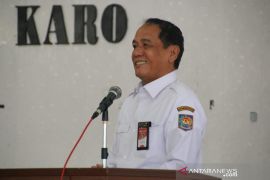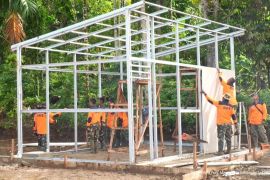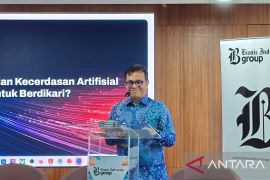"We have received information about the failure of Telkom-3 satellite launch."Jakarta (ANTARA News) - Indonesian telecommunication services company Telkom has acknowledged that the Briz-M booster failed during the launch of Telkom-3 satellite from Baikonur Cosmodrome, Kazakhstan, on Monday (August 6, 2012) at 7.31 pm Russian time.
"We have received information about the failure of Telkom-3 satellite launch, which was caused by the malfunction of the Briz-M rocket booster," said Slamet Riyadi, the company`s Head of Corporate Communication Affairs, here on Tuesday.
According to NASAspaceflight.com, the Telkom-3 satellite which was launched along with an Express-MD2 satellite, atop a Proton-M rocket was reported to be lost several hours before reaching the destination orbit due to a failure of the upper stage of the launch.
Meanwhile, Russian space agency Roscosmos said in a press release that the agency was still uncertain about the location of both satellites.
However, Slamet declined to go into details about loss of Telkom-3 satellite, saying that the company was awaiting official confirmation from ISS-Reshetnev the team that built the satellite.
He said a number Telkom directors witnessed the satellite launch that required an investment of US$200 million.
"The Chief of the Mission Telkom-3 satellite is Rizkan Chandra, who is also the Director of Network and Solution, Telkom," Slamet stated.
Telkom-3 satellite was built by Russian space company Reshetnev, while the satellite's communication equipment was developed by Thales Alenia Space.
"It had a capacity of 42 C- and Ku-band active transponders to provide telecom services for Indonesian customers," Slamet said.
"This was the first time that Indonesia had bought a satellite from Russia," he added.
The Express MD2 was a small communication satellite, made by the Khrunichev State Research and Production Space Centre, for the Russian Satellite Communications Company (RSCC).
The satellite featured 8 C-band transponders and 1 L-band transponder to relay, round the clock, data streams to multiple users within the Russian Satellite Communications and Broadcasting System. *** 2 ***
(U.A050/INE/KR-BSR/A014)
Editor: Priyambodo RH
Copyright © ANTARA 2012









